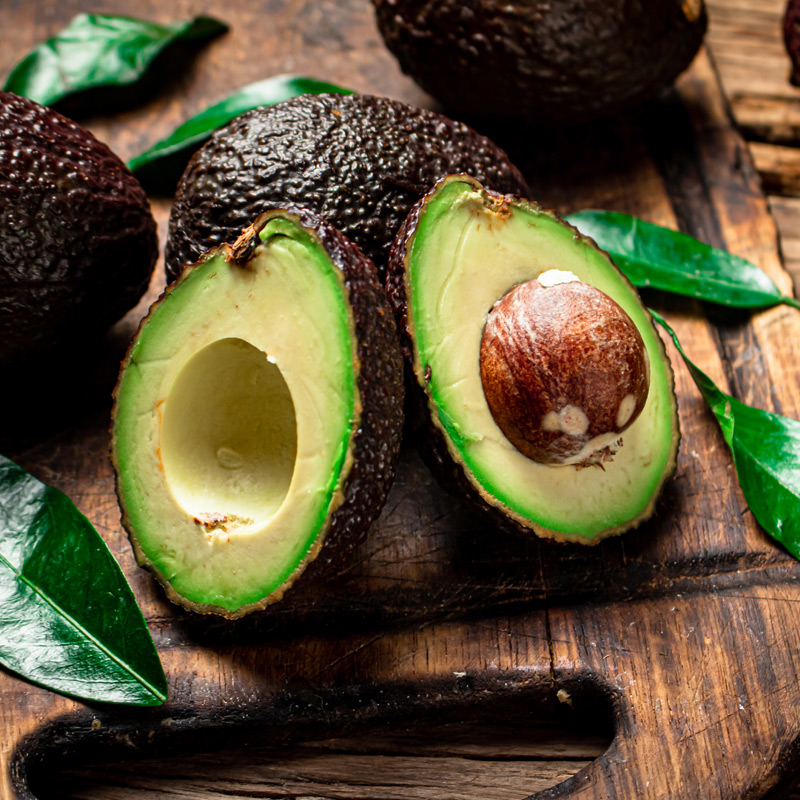
100 gr |
-- |
|
|---|---|---|
| Carbohydrate (gr) | 15.04 |
4928.47 |
| Protein (gr) | 3.59 |
1176.23 |
| Fat (gr) | 12.46 |
4083.43 |
| Fiber (gr) | 1.36 |
445.97 |
| Cholesterol (mg) | 14.64 |
4795.8 |
| Sodium (mg) | 325.27 |
106557.75 |
| Potassium (mg) | 392.16 |
128471.4 |
| Calcium (mg) | 78.15 |
25603.27 |
| Vitamin A (mg) | 46.04 |
15084.01 |
| Vitamin C (mg) | 6.16 |
2019.31 |
| Iron | 0.62 |
203.1 |
Avocado, a tropical fruit originally from Central Mexico, has a vibrant green skin and a large seed, and is notably rich in fiber. It's a nutrient-packed food that plays a vital role for those pursuing a balanced diet, thanks to its abundance of vitamins and minerals.
In 100 grams of avocado, there are 160 calories.
The benefits of avocado are nearly endless. Rich in energy, avocado helps prevent cholesterol buildup due to its unsaturated fatty acids. This makes it a powerful natural remedy for heart health. High in folic acid, it also supports both mother and baby during pregnancy. Furthermore, its high potassium content aids in kidney function and regulates blood pressure. Avocado is a valuable source of omega-6 and omega-9 fatty acids, which can enhance metabolism and aid in fat burning. Since avocado helps one feel full, it can support weight loss when eaten regularly. Additionally, its high fiber content can help prevent constipation.
Among its many other benefits, avocado’s antioxidants offer protection against various cancers. As a vision-supporting fruit, it contains beta-carotene, lutein, and zeaxanthin, essential for eye health. Avocado is also beneficial for the skin; its nutrients help make the skin glow and slow down signs of aging. For this reason, avocado is a popular ingredient in the cosmetic and skincare industries. Its fat-soluble antioxidants—such as vitamins A, D, E, K, lycopene, and beta-carotene—are readily absorbed thanks to avocado’s healthy fats. Research suggests that adding avocado to salads can increase antioxidant absorption by up to 15 times.
The avocado plant, indigenous to Central Mexico, also thrives along the northern coast of Guatemala and in South America. The name avocado comes from a tree in the laurel family, which includes cinnamon and camphor. Avocado trees grow best in tropical and subtropical climates, as they are sensitive to cold. Unlike most fruits, avocado’s energy comes mainly from healthy fats rather than sugars. Known as the "butter pear" in the 17th and 18th centuries, it is still called "butter fruit" in parts of India due to its creamy texture and high-fat content.
As avocado consumption rises, so does curiosity about its cultivation. Climate is a critical factor in avocado farming. Mexico produces over a million tons of avocados annually, while Turkey’s avocado production remains modest. Almost half of Turkey’s 1,000-ton annual avocado harvest comes from Alanya, with additional crops grown in Antalya, Mersin, and other areas with warm climates. The avocado plant thrives in mild climates, while frost-prone areas may hinder growth.
Home avocado gardening has recently become popular. Spring is the ideal time to grow an avocado plant indoors. Begin by washing and drying a ripe avocado seed. After soaking the seed in water for about five minutes, pierce it with three toothpicks and place it in a glass of water, with the pointed side facing up. Place it in a bright, indirect sunlight area. Your seed should sprout within eight weeks. If you live in a warm and humid climate, you can eventually transplant the sprouted avocado into your garden, but it may take 5–13 years to produce fruit.
Avocados are available year-round at most grocery stores. Imported avocados are generally available in the summer, while locally grown avocados are in season from September through June. Prices vary with the season, typically lower during peak harvest.
Selecting a ripe avocado is essential since avocados are relatively expensive. When freshly picked, they are quite firm, and it takes time for them to soften. The ripening time varies with avocado type. Thin-skinned varieties take 2–3 days at room temperature.